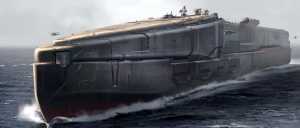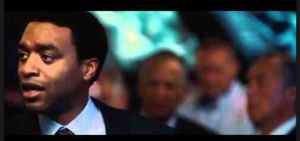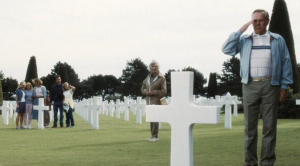
The film 2012 (2009) depicts a world struck by an apocalyptic flood, killing off close to the whole of humanity. However, the impending disaster is discovered early by the government. This gives the world leaders time to ensure the continuation of humanity by constructing giant arks to save a selected few and overcome the apocalypse. Initially, there is a very utilitarian angle at which people in key positions of power make their decisions, where anything can be sacrificed ‘for the greater good’. In this case, greater good refers to the prevention of the extinction of the human race. Meanwhile, the sacrifices ranges from keeping the oncoming apocalypse a secret from the entire world, assassinating anyone that might divulge information of the apocalypse and selling seats on the arks for one billion euros each. All of this has a very clear theme of making sacrifices to prevent humanity’s extinction. This basis for decision making aims to ensure the goal of survival is met through purposeful sacrifices, a logical and detached weighing of the pros and cons to determine which decision brings about the most benefit. An example would be how the apocalypse is kept a secret in order to prevent anarchy and chaos. In this case, people are deprived of the knowledge that they will die in a few years preventing them from living the last few years of their lives however they want. However, there is a change in the basis for decision making and reasoning of people in positions of power midway through the text. US President Wilson decides to abandon his opportunity for evacuation and a seat on the arks even though that is the logical thing to do. Another instance is when the world leaders take a huge risk to save a few hundred more people, which is illogical and risks everything they have fought for.
Hence, it is interesting to see a change in the basis for decision making and reasoning of people in key positions of power through the text. It changes from one that is utilitarian in nature, with a willingness to sacrifice anything for the greater good to another perspective that is emotional and values lives, a more humane basis that does not look at lives as mere numbers. Hence, it would be interesting to unwrap why there is such a change. In this essay, I will attempt to answer this question. I believe that there are two reasons for this change: firstly, the onset of the apocalypse and the reality of it bears a stark difference from the planning and simulation process; secondly, the remaining survivors live by sacrificing everyone else, hence there is an onus upon them to do what is morally correct and not dishonor the sacrifices made, rather than what might seem logical. By being able to understand why there is a change in their basis for decision making, we can understand how significantly stressful events in our lives can have an impact on our basis for decision making.
Preparing for the inevitable
Throughout scenes in the text, we see that the United States is the nation spearheading the entire process of saving the human race. It discovers the oncoming apocalypse also monitors it. It is also the United States that made the decision to begin having people board the arks in the face of the impending apocalypse. This clearly implies that the United States is leading the whole process. Most likely, they have a significant role throughout the process to save the human race. Some of the measures taken include government sanctioned assassinations to prevent any information from leaking, charging one billion euros for a seat in the ark as well as the preservation of cultural art pieces such as the Mona Lisa. Such actions seem reprehensible but upon examination, are required for the greater good.

Although charging so much for a spot on an ark is akin to pricing a human life, the private funding is necessary for the arks’ construction. The assassinations were needed to prevent information from leaking, which would have caused widespread chaos and might have affected the plan to save the human. Since the United States has such a vital role in preventing the extinction of the human race, we can conclude that the President of the United States must have had agreed to everything. In a way, he embodies the utilitarianism adopted by the governments in the plan to prevent the extinction of the human race. However, there is a change in Thomas’s basis for decision making midway through the text, when he makes the decision to stay behind in Washington even when it means certain death. Logically, he should have evacuated as well due to his responsibility as the leader of the American forces. Him staying would result in the remaining Americans be akin to a headless snake. During one of Wilson’s final moments, he is seen coming to terms with the realization that he is the last president of the United States, even claiming that perhaps they should have held a lottery to determine who gets onboard the arks. This is a stark difference from the President of before, which approved the assassinations and the rest of the plan.
Preparation Versus Reality

I believe the reason for this change in President Wilson is because the onset of the apocalypse and the realities of it vastly differ from any planning or projections that were done beforehand, affecting him deeply. During the planning process, Wilson mainly dealt with statistics and projections, the millions of lives that would be lost were just numbers on paper. The impending apocalypse was simply a problem that needed to be solved. Solutions would be brainstormed and implemented. However, with the actuality of the apocalypse, he sees the reality of his actions and begins to question his decisions. Especially since he is in the White House, the center of everything, he would have received firsthand reports of the advancing apocalypse coupled with video reports of the destruction of entire cities. All of this would definitely be jarring for anyone, more so for Wilson, with the decisions he had made. A similar scenario is described by Michele Chwastiak’s article on the Vietnam War (2006). She introduces how the usage of language can “highlight certain aspects of a situation and silence others”, while describing mistakes the leaders of the United States could have made while planning for the Vietnam war. A parallel with the language used can be drawn with Wilson’s discussions with the rest of the government while preparing for the apocalypse. Most likely, abstract words and technical terms and numbers were used, downplaying the value of human life as well as the significance of what they were planning to do. Another contributing factor that would have an effect on Wilson would be seeing the billions of lives being lost every minute, an indirect result of his decisions. In The Machinist (2004), a psychological thriller of a man who suffers increasingly insidious hallucinations, we see at the end the cause of the hallucinations is because of he’s involvement in an accidental murder.
This emphasises the impact of causing death on the human psyche, where in this case the protagonist was borderline suicidal. The Machinist depicts the severe effects of accidentally killing one someone – we can only imagine the sheer pressure Wilson must have felt when he saw the entire world dying, with himself being partially responsible. From this, we can conclude that the reason why the president decided to stay in Washington, despite knowing it means certain death, is because the reality of the apocalypse was very different from what he had expected. This had a significant impact on him, ultimately affecting his basis for decision making and causing him to abandon the opportunity to evacuate.
Another incident shows the change in the basis for decision making for people in key positions of power. Towards the end of the text, the world leaders are faced with a dilemma. Majority of the survivors have already boarded the arks and are safe. There is only a few hundred people still trapped on the harbor. The dilemma faced is whether the arks’ gates should be reopened to save the few hundred trapped outside when the tsunami is seconds away. Leaving the gates closed might add very slightly to the casualty count, which is already in the billions, but ensure the survival of the human race. Reopening the gates might save the few hundred more people, but risks an entire ark and possibly the whole of human race. The logical decision would be to leave the gates closed and ensure prevent any risk to the continuation of the human race. Afterall, the additional casualty count is irrelevant in the face of the billions already dead across the world. From a numbers perspective, reopening the gates would not seem worth the risk. However, the gates were still opened by the very same people that made the decision to sacrifice the rest of the world. This allows us to conclude that there has been a change in the basis for decision making of the people in positions of power.
The weight of sacrifice
I believe that the driving force for such a change is because these people have managed to survive the apocalypse by sacrificing the rest of the world. During a dialogue where a character, Adrian Helmsley, is trying to convince the world leaders to reopen the gates, he says “Everybody out there has died in vain if we start our future with an act of cruelty. “.

This act of cruelty refers to not reopening the gates, effectively killing the hundreds out there. By this dialogue, we begin to understand that the rest of the world has died for the purpose of the continuation of the human race. Their deaths were the price of to pay for these people on the Arks to survive. Hence there is an onus upon these survivors to not dishonour the sacrifice that has been made for them. This is the implied meaning behind Adrian’s words. He reminds the world leaders of the people that have been sacrificed, hence changing their perspective and convincing them of what is the right decision to make. This is very similar to the Gettysburg Address (1963) by President Lincoln. He speaks of the sacrifices the soldiers have made while fighting and eventually winning the American civil war. He mentions how it is important that the living continue to be dedicated to the task that the others have died for. This notion of sacrifice is very similar to the sacrifice in the text. Hence as Adrian reminds the surviving world leaders of the sacrifices that have been made so that they can live, there is an impact on their basis for decision making and reasoning. No longer can they make decisions solely by weighing the pros and cons and the probabilities involved – they need to take into account the fact that they are living for others. They live on because others have been sacrificed for them. Another text that shows the impact of sacrifice on those that live on is Saving Private Ryan (1988). It details the journey of an American squad through the frontline during World War II to find Private Ryan. Throughout this journey, multiple lives are lost but eventually Private Ryan is brought back home. The text ends with Private Ryan standing at the graves of the soldiers that died for him, asking “Am I a good man?”.

He asks this because of the multiple lives that have been lost to bring him back home. Many were sacrificed for him to live on, hence the question of whether he was worth their sacrifices. This drives home the fact that when someone lives on through the sacrifices of others, there is an onus upon them to live a life that is worth the sacrifice that has been made. Hence, we can see why there is a change in the basis for decision making and reasoning of the world leaders. The sacrifices that were made for them has given them the responsibility to do what is right rather than what is logical.
Conclusion
Ultimately, both the US president the rest of the world leaders showed a change in their basis for decision making and reasoning through the course of the film. It is also interesting to note the similarities between the two reasons. President Thomas was impacted by his past actions, when he saw the disparity between planning and reality. Meanwhile, the world leaders were impacted by the sacrifices that were made for them to survive. Both were impacted by actions in the past, causing a change in their present perspective. All in all, this article gives us a better idea of how pivotal events in our lives can have an impact on our basis for decision making.
References
Anderson, B. (Director). (2004). The Machinist [Motion picture]. Barcelona: Filmax.
Chawstiak, M. (2006). Rationality, performance measures and representations of reality: planning, programming and budgeting and the Vietnam war. Critical Perspectives on Accounting, 17(1), 29-55.
Emmerich, R. (Director). (2009). 2012 [Motion picture]. Los Angeles: Columbia Pictures.
Spielberg, S. (Director). (1998). Saving Private Ryan [Motion picture]. Los Angeles: Dreamworks Pictures.
